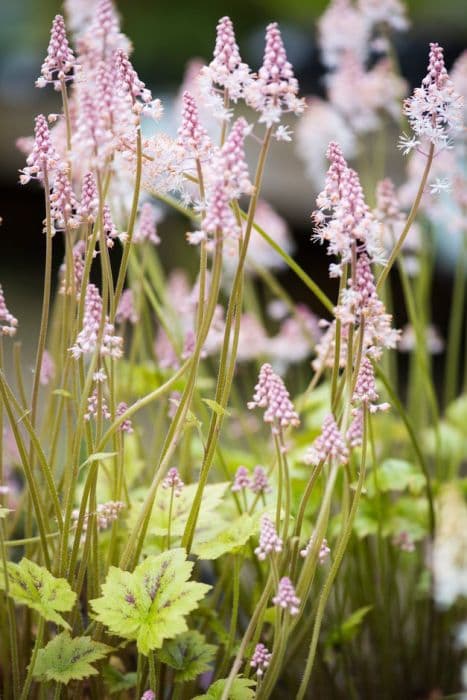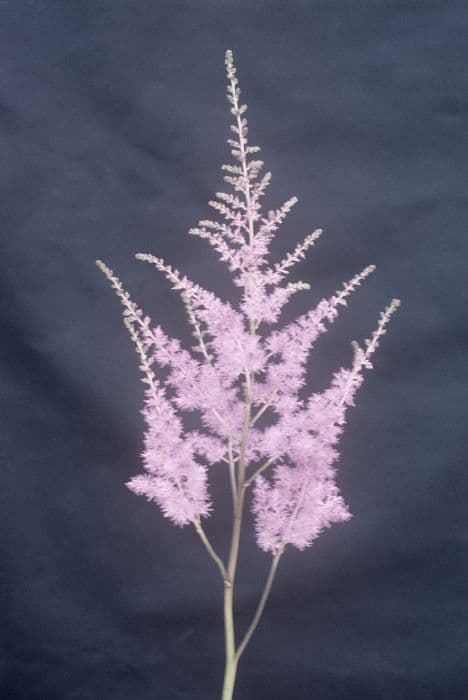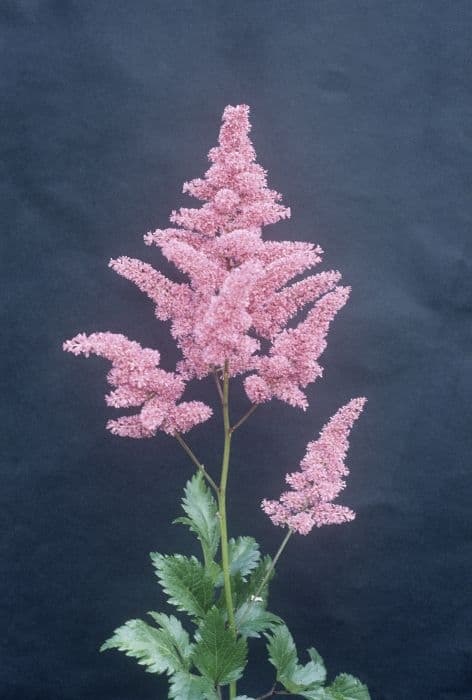Foam flower 'Tiger Stripe' Tiarella 'Tiger Stripe'

ABOUT
'Tiger Stripe' is a clump-forming perennial to 40cm high with heart-shaped, lobed leaves up to 10cm across. Leaves are bright green in spring and summer, striped and mottled with purple, and evergreen in mild winters, turning shades of purple and bronze in autumn. Tiny pale pink flowers are borne on erect, wiry stems above the mound of foliage in late spring and early summer
About this plant
 Names
NamesFamily
Saxifragaceae
Synonyms
Foamflower, Tiger Stripe Foamflower
Common names
Tiarella 'Tiger Stripe'
 Characteristics
CharacteristicsLife cycle
Perennials
Foliage type
Semi-deciduous
Color of leaves
Variegated
Flower color
White
Height
6-12 inches (15-30 cm)
Spread
12-18 inches (30-45 cm)
Plant type
Herb
Hardiness zones
4-9
Native area
North America
Benefits
 General Benefits
General Benefits- Aesthetic Appeal: The Tiarella 'Tiger Stripe', also known as foamflower, has attractive foliage with distinct markings that resemble tiger stripes, adding visual interest to gardens and landscapes.
- Shade Tolerance: Foamflower thrives in shaded areas where many other plants may struggle, making it ideal for woodland gardens and under trees.
- Low Maintenance: Foamflower requires minimal care once established, making it a convenient choice for gardeners of all skill levels.
- Ground Cover: Its clump-forming habit makes it an excellent ground cover, helping to suppress weeds and reduce soil erosion.
- Seasonal Interest: Foamflower offers seasonal interest with its spring blooms and attractive foliage that can change color in the fall.
- Attracts Pollinators: The flowers of foamflower attract bees and butterflies, promoting biodiversity and benefiting the overall health of the garden ecosystem.
- Disease Resistance: Foamflower is generally resistant to many diseases, ensuring it remains healthy and attractive without the need for chemical treatments.
 Medical Properties
Medical PropertiesThis plant is not used for medical purposes.
 Air-purifying Qualities
Air-purifying QualitiesThis plant is not specifically known for air purifying qualities.
 Other Uses
Other Uses- Tiarella 'Tiger Stripe', commonly known as Foamflower, can be used to create intricate and whimsical patterns in fairy gardens due to its attractive foliage.
- Its variegated leaves could be used as a natural fabric dye source for subtle, earth-toned colors in small-scale textile projects.
- Foamflower can be planted in small pots and used as living centerpieces for tables at eco-friendly events or weddings.
- The plant may serve as a muse for artists and photographers, offering a unique texture and pattern to inspire works of art and macro photography.
- Tiarella 'Tiger Stripe' can potentially be used in educational settings for botanical studies or as a live example of variegation in plants.
- The contrasting leaves of Foamflower can be used to craft plant-based prints on paper, creating natural and eco-friendly art supplies and decorations.
- It could be implemented in outdoor, nature-inspired mazes or labyrinths in gardens as a low-height border plant that adds aesthetic appeal without obstructing the view.
- Utilize Foamflower in culinary experiences by freezing its non-toxic leaves in ice cubes for decorative, botanical-infused drinks (subject to safety confirmation).
- This plant can be a component in living walls or vertical gardens, especially in spots that require shade-loving plants with visual interest.
- For hobbyists who create miniature landscapes, such as model railway enthusiasts, Foamflower can be included to represent dense, variegated ground cover in scale dioramas.
Interesting Facts
 Feng Shui
Feng ShuiTiarella is not used in Feng Shui practice.
 Zodiac Sign Compitability
Zodiac Sign CompitabilityTiarella is not used in astrology practice.
 Plant Symbolism
Plant Symbolism- Elegance: Tiarella, also known as Foamflower, often symbolizes elegance due to its delicate foliage and subtle flowers.
- Resilience: As a woodland perennial that flourishes in shade, Foamflower represents resilience and the ability to thrive in overshadowed conditions.
- Purity: The white to pale pink blooms of the Foamflower are often associated with purity and innocence.
- Enduring Love: The perennial nature of Foamflower and its heart-shaped leaves can be symbolic of enduring and steadfast love.
- Rarity: The 'Tiger Stripe' variety, with its striking foliage, might symbolize uniqueness and rarity, celebrating individuality and standing out.
 Water
WaterFoamflower should be watered deeply enough to saturate the root zone, approximately once a week during the growing season, but the frequency of watering can vary based on temperature and soil moisture levels. It's better to water this plant less frequently but thoroughly, which might equate to around 1 gallon per plant each week for established plants. During periods of drought or extreme heat, increase watering slightly to maintain evenly moist soil, but avoid overwatering which can lead to root rot. In winter, reduce watering significantly to match the plant's slower growth rate and prevent soggy soil, which can be harmful in colder conditions.
 Light
LightFoamflower, or Tiarella 'Tiger Stripe', thrives best in partial to full shade. It should be placed in a spot where it is protected from the harsh afternoon sun which can scorch its leaves. Morning light or dappled sunlight is ideal for this plant, making it an excellent choice for woodland gardens or the shaded areas under trees and shrubs.
 Temperature
TemperatureFoamflowers prefer temperatures that regularly stay between 60 and 75 degrees Fahrenheit but can tolerate a range between 50 and 85 degrees Fahrenheit. They are cold-hardy and can survive winter temperatures down to around -30 degrees Fahrenheit, making them suitable for many temperate regions. Optimal growth usually occurs when the ambient temperature stays within the ideal range, and the plant is protected from extreme heat.
 Pruning
PruningFoamflowers should be pruned to remove any dead or damaged foliage, to maintain a tidy appearance, and to encourage new growth. The best time to prune is in early spring or after the flowering has ceased. Deadheading spent flowers can prolong the blooming period and prevent the plant from seeding excessively. Pruning should be done as needed, usually once a season, to keep the plant healthy and visually appealing.
 Cleaning
CleaningAs needed
 Soil
SoilFoamflower 'Tiger Stripe' thrives in well-draining, humus-rich soil with a pH range of 5.8 to 6.8. For best results, mix equal parts of loamy garden soil, peat moss, and perlite or coarse sand to ensure good drainage and aeration. Regularly enriched soil with compost can also promote healthy growth.
 Repotting
RepottingFoamflower 'Tiger Stripe' should be repotted every 2 to 3 years or when it outgrows its current pot. This will help maintain its health and vigor by providing fresh soil and room for root growth.
 Humidity & Misting
Humidity & MistingFoamflower 'Tiger Stripe' prefers moderate to high humidity levels, ideally between 50% and 70%. Maintaining such humidity levels around the plant will help it thrive.
 Suitable locations
Suitable locationsIndoor
Place Foamflower 'Tiger Stripe' in bright, indirect light indoors, keep soil moist.
Outdoor
Plant Foamflower 'Tiger Stripe' in partial shade, in moist, rich soil.
Hardiness zone
4-9 USDA.
 Life cycle
Life cycleTiarella 'Tiger Stripe', commonly known as Foamflower, begins its life cycle as a seed, which upon germination in favorable conditions, such as moist, well-drained soil and partial shade, sprouts into a young plant. As it grows, it develops distinctive heart-shaped, green leaves with tiger-like dark striping, and eventually forms a low-growing, clumped perennial. In spring to early summer, the Foamflower enters its flowering stage, producing delicate, creamy-white flower spikes that rise above the foliage and attract pollinators. After blooming, the flowers produce small capsules containing seeds, which when mature, disperse to give rise to new plants. In the fall, the foliage may acquire autumnal hues, adding seasonal interest to the garden. Through the winter, Tiarella ‘Tiger Stripe’ remains semi-evergreen, depending on the climate, and regenerates the following spring to continue its cycle.
 Propogation
PropogationPropogation time
Spring to early summer
Propogation: The best time to propagate Tiarella 'Tiger Stripe', commonly known as foamflower, is in the spring or early summer when the plant's growth is most active. The most popular method of propagation for foamflower is through division. This involves carefully separating the plant into smaller clumps, making sure each section has a portion of the root system intact. With a sharp knife or spade, you can slice through the center of the plant to create new plants, each with its own root system. After dividing, the individual clumps should be immediately planted in moist, well-drained soil and watered thoroughly. This ensures they establish quickly in their new location, taking advantage of the warmer temperatures and longer days of the growing season.









